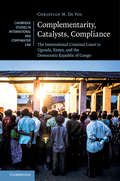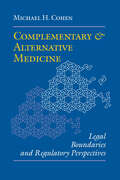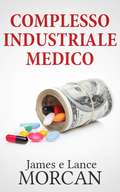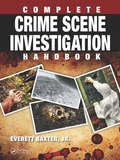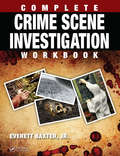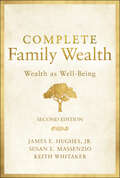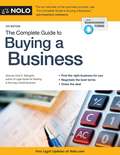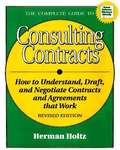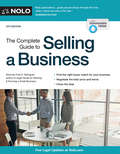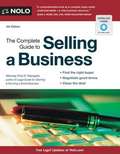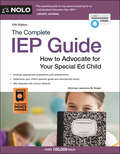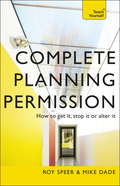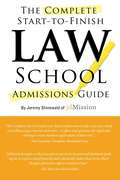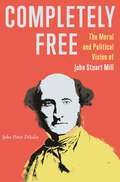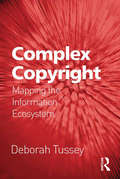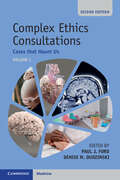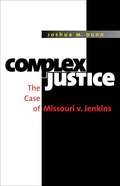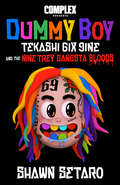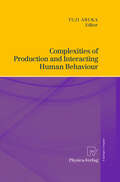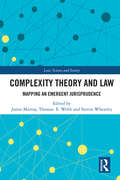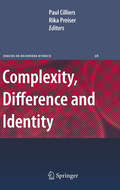- Table View
- List View
Complementarity in the Line of Fire
by Sarah M. H. NouwenOf the many expectations attending the creation of the first permanent International Criminal Court, the greatest has been that the principle of complementarity would catalyse national investigations and prosecutions of conflict-related crimes and lead to the reform of domestic justice systems. Sarah Nouwen explores whether complementarity has had such an effect in two states subject to ICC intervention: Uganda and Sudan. Drawing on extensive empirical research and combining law, legal anthropology and political economy, she unveils several effects and outlines the catalysts for them. However, she also reveals that one widely anticipated effect – an increase in domestic proceedings for conflict-related crimes – has barely occurred. This finding leads to the unravelling of paradoxes that go right to the heart of the functioning of an idealistic Court in a world of real constraints.
Complementarity, Catalysts, Compliance: The International Criminal Court in Uganda, Kenya, and the Democratic Republic of Congo (Cambridge Studies in International and Comparative Law #147)
by Christian M. De VosSince its establishment at the turn of the century, a central preoccupation of the International Criminal Court (ICC) has been to catalyse the pursuit of criminal accountability at the domestic level. Drawing on ten years of research, this book theorizes the ICC's principle of complementarity as a transnational site and adaptive strategy for realizing an array of ambitious governance goals. Through a grounded, inter-disciplinary approach, it illustrates how complementarity came to be framed as a “catalyst for compliance” and its unexpected effects on the legal frameworks and institutions of three different ICC “situation countries” in Africa: Uganda, Kenya, and the Democratic Republic of Congo. Linking complementarity's law and practice to contemporary debates in international law and relations, the book unsettles international law's dominant progressive narrative. It urges a critical rethinking of the ICC's politics and a reorientation towards international criminal justice as a project of global legal pluralism.
Complementary and Alternative Medicine: Legal Boundaries and Regulatory Perspectives
by Michael H. CohenExplores the legal issues that health care providers, institutions, and regulators confront as they contemplate integrating complementary and alternative medicine into mainstream U.S. health care. A third of all Americans use complementary and alternative medicine—including chiropractic, acupuncture, homeopathy, naturopathy, nutritional and herbal treatments, and massage therapy—even when their insurance does not cover it and they have to pay for such treatments themselves. Nearly a third of U.S. medical schools offer courses on complementary and alternative therapies. Congress has created an Office of Alternative Medicine within the National Institutes of Health, and federal and state lawmakers have introduced legislation authorizing widespread use of such therapies. These institutional and legislative developments, argues Michael H. Cohen, express a paradigm shift to a broader, more inclusive vision of health care than conventional medicine admits. Cohen explores the legal issues that health care providers (both conventional and alternative), institutions, and regulators confront as they contemplate integrating complementary and alternative medicine into mainstream U.S. health care. Challenging traditional ways of thinking about health, disease, and the role of law in regulating health, Cohen begins by defining complementary and alternative medicine and then places the regulation of orthodox and alternative health care in historical context. He next examines the legal ramifications of complementary and alternative medicine, including state medical licensing laws, legislative limitations on authorized practice, malpractice liability, food and drug laws, professional disciplinary issues, and third-party reimbursement. The final chapter provides a framework for thinking about the possible evolution of the regulatory structure. This book is the first to set forth the emerging moral and legal authority on which the safe and effective practice of alternative health care can rest. It further suggests how regulatory structures might develop to support a comprehensive, holistic, and balanced approach to health, one that permits integration of orthodox medicine with complementary and alternative medicine, while continuing to protect patients from fraudulent and dangerous treatments.
Complesso Industriale Medico
by James Morcan Lance Morcan A. IngenitoQuesta è una ricerca, articolata e fedele, della verità sul sistema che collega servizi sanitari, industrie farmaceutiche, ambienti medici universitari, assicurazioni e ricerche mediche innovative, in cui i Morcan propongono un esauriente compendio sulle logiche sociali e di mercato che guidano la medicina moderna, citando alcuni importanti esperti dei diversi settori. Così i capitoli si susseguono, facendo eco sia ai sostenitori che ai detrattori della ricchissima industria della salute, cercando di comunicare al lettore l'unica cosa veramente importante, ossia che le giuste informazioni possono aiutarci sul serio a capire come curarci e a guarire. Farmaci tradizionali o alternativi, di sintesi o naturali, tutti hanno i loro pro e contro ma, qualora se ne conosca il vero potenziale, costituiscono un potenziamento del nostro armamentario terapeutico. Seppure molti di noi, soprattutto in occidente, sono il riflesso di un'umanità che subisce passivamente cure inefficaci e trattamenti pericolosi solo in nome del denaro, la verità è che risulta molto più sano e gratificante conoscere se stessi, mente e corpo, e scegliere quale strada seguire per arrivare alla guarigione.
Complete Crime Scene Investigation Handbook
by Everett Baxter Jr.Crime scene investigators are the foundation for every criminal investigation. The admissibility and persuasiveness of evidence in court, and in turn, the success of a case, is largely dependent upon the evidence being properly collected, recorded, and handled for future analysis by investigators and forensic analysts in the lab. Complete Crime Sce
Complete Crime Scene Investigation Workbook
by Everett Baxter Jr.This specially developed workbook can be used in conjunction with the Complete Crime Scene Investigation Handbook (ISBN: 978-1-4987-0144-0) in group training environments, or for individuals looking for independent, step-by-step self-study guide. It presents an abridged version of the Handbook, supplying both students and professionals with the mos
Complete Family Wealth: Wealth as Well-Being (Bloomberg Ser.)
by James E. Hughes Jr. Susan E. Massenzio Keith WhitakerA primer for families of high net worth on how to manage their qualitative and financial wealth for generations The second edition of this foundational work, Complete Family Wealth: Wealth as Well-Being provides proven tools and best practices for families of means to use in maturing, maintaining, and managing personal and legacy wealth long into the future. The book is divided into three parts: the "what"—what is meant by family, wealth, and enterprise; the "who"—the persons crucial to family enterprise flourishing; and the "how"—specific practices families can use to enhance and grow family wealth. The second edition of this work places the health and well-being of the individual members of the family unit at the forefront of every aspect detailed within the book. A natural product of this focus is an increased awareness of the social complexities of wealth that have come to the fore in recent years, and the team of expert authors here address the responsibility of private wealth to the public good. In addition, Complete Family Wealth's second edition provides readers with: A new chapter on "the big reveal," suggesting ways to encourage positive, life-affirming reception of the revelation of present or future wealth An additional chapter on preserving the beloved family vacation home Two new appendices: "Fiduciary Course Curriculum," dedicated to enhancing the education of trustees and beneficiaries; and "Key Practices for Families During Challenging Times," a response to the pandemic but relevant to all trying periods for families Examples that make these practices accessible to a broad audience across the wealth spectrum. Having shaped the language used by families and their advisors with the first edition, Complete Family Wealth's second edition is essential reading for families of high net worth and their financial advisors. It will also be of interest to family offices, fund managers, as well as private investors.
Complete Guide to Buying a Business, The
by Fred S. SteingoldA perfect guide for entrepreneurs Whether you just want an overview of the business buying process or you're ready to acquire an existing business, you know you'll need to finance, negotiate and structure the deal and protect yourself from unpleasant surprises. The Complete Guide to Buying a Business will give you everything you need to know including more than two dozen crucial forms and legal documents to help you do it. You'll learn how to: find the right business analyze the seller's numbers make sense of the tax issues avoid outstanding liens and liabilities prepare and sign a sales agreement close the deal prevent the seller from competing against you work with lawyers, accountants and brokers The 4th edition of The Complete Guide to Buying a Business is completely updated to reflect the latest laws and tax information.
Complete Guide to Consulting Contracts
by Herman HoltzIn this new edition with the forms on disk, The Complete Guide to Consulting offers legal, binding, and enforceable agreements at the click of a button. Readers can use the built-in software or pull the forms up into popular word-processing packages. Either way, consultants can use more than 40 model agreements and clauses to customize forms.
Complete Guide to Selling a Business, The
by Fred S. SteingoldThe most comprehensive, easy-to-use guide to selling a business available! Out there somewhere is a buyer looking to buy a business like yours -- so if you're ready to sell, make sure that you protect your interests and maximize your profit with The Complete Guide to Selling a Business. It covers: getting your business ready to sell pricing your business and valuing your assets finding the right buyer analyzing the tax issues negotiating a payment plan and other terms of sale planning your future relationship with the business limiting your liability working with lawyers, accountants and brokers closing the deal and transferring the business to its new owner The Complete Guide to Selling a Business helps you create more than two dozen crucial documents for both asset and entity sales, including: the sales agreement confidentiality letter promissory notes and security agreements noncompete and consulting agreements closing checklists This edition edition is completely updated with the latest tax considerations, and now provides more advice on marketing the sale of your business. There are literally dozens of competing titles on the market, but none can match The Complete Guide to Selling a Business for sheer depth, accuracy and ease of use.
Complete Guide to Selling a Business, The
by Fred S. Steingold AttorneyThe most comprehensive, easy-to-use guide to selling a business available! It covers: getting your business ready to sell pricing your business and valuing your assets finding the right buyer analyzing the tax issues negotiating a payment plan and other terms of sale planning your future relationship with the business limiting your liability working with lawyers, accountants and brokers closing the deal and transferring the business to its new owner The Complete Guide to Selling a Business helps you create more than two dozen crucial documents for both asset and entity sales, including: the sales agreement confidentiality letter promissory notes and security agreements noncompete and consulting agreements closing checklists This edition is completely updated with the latest tax considerations, and now provides more advice on marketing the sale of your business. There are literally dozens of competing titles on the market, but none can match The Complete Guide to Selling a Business for sheer depth, accuracy and ease of use. Download forms for book on nolo.com
Complete IEP Guide, The: How to Advocate for Your Special Ed Child
by Lawrence M. SiegelRecipient of the 2017 BRONZE Winner for Education Award from Foreword Indies. Get the educational services and support your child deserves Federal law guarantees every child a free appropriate education, and the goal of the Individualized Education Program (IEP) is to assure that every child with special needs receives what the law promises. But if you have a special ed child, you know that your family must make sure the school follows through. This powerful book covers: eligibility rules and assessments working with outside experts developing your child's ideal educational program preparing for and attending IEP meetings, and resolving disputes with school districts. The 10th edition includes summaries of important court decisions, expanded information on independent evaluations and bullying, and additional real-life tips. It provides key forms, sample letters, and resources you need at every stage of the IEP process. With it, you can make sure your child gets a good education—the education he or she deserves. With downloadable forms, letters and resources inside. Includes IEP blueprint.
Complete Planning Permission: How to get it, stop it or alter it
by Roy Speer Mike DadeThe UK Planning Regulations are a minefield for anyone looking to build a new home - and for those who are worried about the impact of a new planning application near their home. Avoid being one of the thousands whose application is turned down - and whose dreams are crushed - by using this book to familiaries yourself with the system and beat it. With a step-by-step guide to every part of the application process and ehaustive coverage of the do's and don'ts this is an essential guide to securing that first step on the path to building your dream home. And if you're worried about a nearby development there are easily implimented strategies for preventing planning permission from being granted. From one of the UK's leading planning consultancies with the very latest on all the new and recent changes to planning law this is the most comprehensive guide avaliable to manipulating the intricacies of this difficult and controversial area.
Complete Planning Permission: Teach Yourself
by Michael Dade Roy SpeerThe UK Planning Regulations are a minefield for anyone looking to build a new home - and for those who are worried about the impact of a new planning application near their home. Avoid being one of the thousands whose application is turned down - and whose dreams are crushed - by using this book to familiaries yourself with the system and beat it. With a step-by-step guide to every part of the application process and ehaustive coverage of the do's and don'ts this is an essential guide to securing that first step on the path to building your dream home. And if you're worried about a nearby development there are easily implimented strategies for preventing planning permission from being granted. From one of the UK's leading planning consultancies with the very latest on all the new and recent changes to planning law this is the most comprehensive guide avaliable to manipulating the intricacies of this difficult and controversial area.
Complete Start-to-Finish Law School Admissions Guide
by Jeremy ShinewaldCovering every aspect of the law school admission process, veteran admissions consultant Jeremy Shinewald provides time-tested advice and concrete direction for serious law school applicants. Addressing ways to enhance personal statements, resumes, recommendations, addenda, interviews and more, Jeremy takes applicants through exercises to ensure that they create a comprehensive application that will enable them to standout. Filled with examples and insight, The Complete Guide to Law School Admissions is sure to become the go-to guide for law school applicants everywhere.
Completely Free: The Moral and Political Vision of John Stuart Mill
by John Peter DiIulioAn original, unified reconstruction of Mill’s moral and political philosophy—one that finally reveals its consistency and full powerFew thinkers have been as influential as John Stuart Mill, whose philosophy has arguably defined Utilitarian ethics and modern liberalism. But fewer still have been subject to as much criticism for perceived ambiguities and inconsistencies. In Completely Free, John Peter DiIulio offers an ambitious and comprehensive new reading that explains how Mill’s ethical, moral, and political ideas are all part of a unified, coherent, and powerful philosophy.Almost every aspect of Mill’s practical philosophy has been charged with contradictions, illogic, or incoherence. Most notoriously, Mill claims an absolute commitment both to promoting societal happiness and to defending individual liberty—a commitment that many critics believe must ultimately devolve into an either/or. DiIulio resolves these and other problems by reconsidering and reconstructing the key components of Mill’s practical thought: his theories of happiness, morality, liberty, and freedom. Casting new light on old texts, DiIulio argues that Mill’s Utilitarianism and liberalism are not only compatible but philosophically wedded, that his theories naturally emanate from one another, and that the vast majority of interpretive mysteries surrounding Mill can be readily demystified. In a manner at once sympathetic and critical, DiIulio seeks to present Mill in his most lucid and potent form.From the higher pleasures and moral impartiality to free speech and nondomination, Completely Free provides an unmatched account of the unity and power of Mill’s enduring moral and political thought.
Complex Copyright: Mapping the Information Ecosystem
by Deborah TusseyThis book draws on a wide selection of interdisciplinary literature discussing complex adaptive systems - including scholarship from economics, political science, evolutionary biology, cognitive science, and religion - to apply general complexity tenets to the institutions, conceptual framework, and theoretical justifications of the copyright system, both in the United States and internationally. The author argues that copyrighted works are the products of complex creative systems and, consequently, designers of copyright regimes for the global 'information ecosystem' should look to complexity theory for guidance. Urging legal scholars to undertake empirical studies of real-world copyright systems, Tussey reveals how the selection of workable configurations for the copyright regime is larger than that encompassed by the traditional, entirely theoretical, debate between private property rights and the commons. Finally, this unique study articulates how copyright law must tolerate certain chaotic elements that may be essential to the sustainability of complex systems.
Complex Ethics Consultations
by Paul J. Ford Denise M. DudzinskiClinical ethicists encounter the most emotionally eviscerating medical cases possible. They struggle to facilitate resolutions founded on good reasoning embedded in compassionate care. This book fills the considerable gap between current texts and the continuing educational needs of those actually facing complex ethics consultations in hospital settings. 28 richly detailed cases explore the ethical reasoning, professional issues, and the emotional aspects of these impossibly difficult consultations. The cases are grouped together by theme to aid teaching, discussion and professional growth. The cases inform any reader who has a keen interest in the choices made in real-life medical dilemmas as well as the emotional cost to those who work to improve the situations. On a more advanced level, this book should be read by ethics committee members who participate in ethics consultations, individual ethics consultants, clinicians who seek education about complex clinical ethics cases, and bioethics students.
Complex Ethics Consultations: Cases that Haunt Us
by Paul J. Ford Denise M. DudzinskiClinical ethics consultants navigate dilemmas across patient care, public health, and healthcare policy. Issues span from the beginning to the end of life, complex discharges, employment of novel technologies, and visitation restrictions. The second edition relays the narratives of fraught, complex consultations through richly detailed cases. Authors explore the ethical reasoning, professional issues, and emotional aspects of these impossibly difficult scenarios. Describing the affective aspects of ethics consultations, authors highlight the lasting effects of these cases on their practices. They candidly reflect on evolving professional practice as well as contemporary concerns and innovations while attending to equity and inclusivity. Featuring many new chapters, cases are grouped together by theme to aid teaching, discussion, and professional growth. The book is intended for clinicians, bioethicists, and ethics committee members with an interest in the choices made in real-life medical dilemmas as well as the emotional cost to those working to improve the situations.
Complex Justice
by Joshua M. DunnIn 1987 Judge Russell Clark mandated tax increases to help pay for improvements to the Kansas City, Missouri, School District in an effort to lure white students and quality teachers back to the inner-city district. Yet even after increasing employee salaries and constructing elaborate facilities at a cost of more than $2 billion, the district remained overwhelmingly segregated and student achievement remained far below national averages. Just eight years later the U.S. Supreme Court began reversing these initiatives, signifying a major retreat from Brown v. Board of Education. In Kansas City, African American families opposed to the district court's efforts organized a takeover of the school board and requested that the court case be closed. Joshua Dunn argues that Judge Clark's ruling was not the result of tyrannical "judicial activism" but was rather the logical outcome of previous contradictory Supreme Court doctrines. High Court decisions, Dunn explains, necessarily limit the policy choices available to lower court judges, introducing complications the Supreme Court would not anticipate. He demonstrates that the Kansas City case is a model lesson for the types of problems that develop for lower courts in any area in which the Supreme Court attempts to create significant change. Dunn's exploration of this landmark case deepens our understanding of when courts can and cannot successfully create and manage public policy.
Complex Presents Dummy Boy: Tekashi 6ix9ine and The Nine Trey Gangsta Bloods
by Shawn SetaroThe story of one of the most controversial figures in all of hip-hop history, Dummy Boy tells the tale of Tekashi 6ix9ine and his meteoric rise to fame.In tracing Danny "Tekashi 6ix9ine" Hernandez's life from Bushwick to the heights of the rap scene, Complex reporter Shawn Setaro illuminates the story of the young rapper who forged an alliance with a notorious street gang to bolster his image and boost his internet clout. Before long, Tekashi's antics and affiliations caught up with him, leading to a major police investigation that tore apart his team and saw him squarely behind bars, facing a life in prison. A thrilling true crime narrative set in the contemporary hip-hop world, Dummy Boy draws on dozens of exclusive interviews with collaborators, associates, and witnesses, to provide a detailed account of the most beguiling and intriguing story in modern music. More than a biography, Dummy Boy is an American crime story, a critical examination of internet trolling in the Trump era, and an exploration of the long-running connection between rap, gangs, and police in New York City.
Complexities of Production and Interacting Human Behaviour
by Yuji ArukaAs the real world is rapidly becoming more and more complicated, economists need to venture beyond the boundaries of mainstream economics and integrate philosophical thought and complexity into their analytical frameworks. In this context, this volume brings together papers on economic theory and its related issues, exploring complex production systems and heterogeneously interacting human behavior. The author challenges economists to integrate economic theory and moral science anew by referring to evolutionary economics and socio-econophysics. The three parts of the book focus on the complexities of production and social interaction, the moral science of heterogeneous economic interaction, and the Avatamsaka's dilemma of the two-person game with only positive spillovers.
Complexity Economics for Environmental Governance (Cambridge Studies on Environment, Energy and Natural Resources Governance)
by Jean-François MercureIn Complexity Economics for Environmental Governance, Jean-François Mercure reframes environmental policy and provides a rigorous methodology necessary to tackle the complexity of environmental policy and the transition to sustainability. The book offers a detailed account of the deficiencies of environmental economics and then develops a theory of innovation and macroeconomics based on complexity theory. It also develops a new foundation for evidence-based policy-making using a Risk-Opportunity Analysis applied to the sustainability transition. This multidisciplinary work was developed in partnership with prominent natural scientists and economists as well as active policy-makers with the aim to revolutionize thinking in the face of the full complexity of the sustainability transition, and to show how it can best be governed to minimize its distributional impacts. The book should be read by academics and policy-makers seeking new ways to think about environmental policy-making.
Complexity Theory and Law: Mapping an Emergent Jurisprudence (Law, Science and Society)
by Steven Wheatley Jamie Murray Thomas WebbThis collection of essays explores the different ways the insights from complexity theory can be applied to law. Complexity theory – a variant of systems theory – views law as an emergent, complex, self-organising system comprised of an interactive network of actors and systems that operate with no overall guiding hand, giving rise to complex, collective behaviour in law communications and actions. Addressing such issues as the unpredictability of legal systems, the ability of legal systems to adapt to changes in society, the importance of context, and the nature of law, the essays look to the implications of a complexity theory analysis for the study of public policy and administrative law, international law and human rights, regulatory practices in business and finance, and the practice of law and legal ethics. These are areas where law, which craves certainty, encounters unending, irresolvable complexity. This collection shows the many ways complexity theory thinking can reshape and clarify our understanding of the various problems relating to the theory and practice of law.
Complexity, Difference and Identity: An Ethical Perspective (Issues in Business Ethics #26)
by Rika Preiser Paul Cilliers"Complexity" has been part of the academic discourse for a decade or two. Texts on Complexity fall mainly in two categories: fairly technical and mathematical on the one hand, and fairly broad, vague and general on the other. Paul Cilliers' book Complexity and Postmodernism. Understanding Complex Systems (Routledge 1998) constituted an attempt to bridge this divide by reflecting more rigorously on the philosophical implications of complexity, and by making it accessible to the social sciences. This edited volume is a continuation of this project, with specific reference to the ethical implications of acknowledging complexity. These issues are pertinent to our understanding of organisations and institutions and could contribute significantly to the development of a richer understanding of ethics in business and would be a useful tool for teachers, researchers and post-graduate students with ethical concerns in disciplines ranging from Philosophy, Applied Ethics, Sociology, Organisational Studies, Political Science, Anthropology and Cultural Studies. The central theme which binds all the contributions together is: the inevitability of normative and ethical issues when dealing with complex phenomena. The book should thus be useful in the development of Business Ethics on two levels: in the first place on the level of developing a strong theoretical foundation, in the second place in providing specific examples of this theory in action in the real world.

